The bluefish run once more. After many years absence, and seasons when the species had been scarce, the great schools of which oldtimers told, have appeared again in Vineyard waters. True, the fish are small, averaging no more than two pounds each, but providing lively sport for both boat and shore fishermen, plus a banquet fit for the gods when served upon the table.
Regardless of opinion, or present day trend, it is the bluefish, rather than the striped bass, which has been the sport fish of this general locality through the generations. The summer guests of seventy years ago, in boats and on the shores, fished for the bluefish with drail, rod and beach-line, and even the most stolid of the Island farmers joined in the sport, for it could be, and was, carried on by night as well as day, and did not interfere with their usual pursuits. The proof of all this may easily be found in any ancient workshop or shed of the Island, where the bluefish jigs of truly ancient day, are still laying, under quantities of junk and the dust of ages, but still intact.
Methods Differ Now
The bluefishing of today differs from that of other years, both in the size of the fish and the methods employed in taking them. The fish being small, the gear and tackle are correspondingly lighter. In place of the foot-long jig, composed of a six-inch leaden fish, with heavy wire for the stringing of an eel-skin, the weather jig with small hook and piano-wire leader is as popular and effective as anything with these small fish. The feather jig itself greatly resembles the small silvery herring upon which the present schools are feeding.
But the scene by day and by night differs but little from that of other days. In the rips, far from land, along the shores, and from the beach itself, the bluefishermen are congregating, and great is the enthusiasm in all locations.
The mackerel gulls betray the schools as they move in along the beaches; this at any hour of the day. But it is accepted that the shadowy dawn, or the equally shadowy twilight of passing day, are the best times to take these fish. Though they breach into the bright sunlight, flashing shapes of blue, green and silver, they take the hook better when the light is failing. And though they may not be compared with the ten and twelve-pound monsters of grand-father’s day, they are a fighting fury, once hooked, calling for the utmost speed in handling, and a degree of skill if the fisher is to dine on roasted bluefish.
Thus, in the favored spots, Cape Pogue, East and West Chop, the Middle Ground Rip, Tashmoo Herring Creek, and various other places, the bluefishermen appear daily and nightly. The calm smooth days bring the schools inshore, where they mass, circle, break and seethe, but the oldest of the fishers prefer a fresh breeze and broken water.
The majority of the boats are motor-driven, with engines capable of being slowed to very moderate headway, but it is apparent that the sailing craft, which move as the wind blows, take the greater number of fish, which is as it always was. The throb of the propellers, the wash of the motor-boats’ wake are credited with disturbing the fish to some extent. Whether or not this is true, those who can sail, and who do sail for blues, enjoy the most excitement and the greater return.
Freemasonry Among Anglers
The freemasonry among bluefishermen is an interesting thing to observe in practice, where rowing skiffs, cruisers, small power-boats and outboard rigs galore, all circle and patrol along the shores. There are one to six or seven lines trailing astern of these boats, and their length may vary from 150 feet to double that length. Care must be observed in steering, especially in circling, lest the lines of one boat foul another, yet such is the courtesy existing among this clan that such things rarely occur.
In this fleet may be found just about every stratum and classification of American society that exists. There is the “idle rich,” if such a social class may be said to exist in this day and age. There are the professional men, doctors, clergymen, musicians and actors. There are farmers and craftsmen, laborers and housewives, boys and girls of all ages, and there are as many races and religions included as exist in the country.
Whatever differences may exist among them otherwise, here they are one clan, with a single purpose and moved by a common courtesy and understanding which is good to see. Though they may not stop to talk things over, the exchange of signals between boats is unceasing. One boat signals to another, with both hands upraised, palms to the front and hands stationary. Wherever this sign originated, no one knows, but everyone understands. It means: “How many?”
To this the fisherman replies with fingers upraised to indicate the number, or he moves his hands rapidly back and forth across his body, as a signalman waves his flags. This means: “None - yet,” for he is always hopeful.
The patience of these fishermen is endless, the sport when it occurs is fast, furious and productive of the greatest enthusiasm. The delight of one, when another lands a fish, is genuine and spontaneous, and if one were to philosophize, the conclusion would be that world unity might be brought about with little difficulty or delay if all men could go fishing together.
Sharks, of varying sizes, and porpoises, move in along the shores these days, following the bluefish, and also the menhaden, which are also present, and which deceive some of the most experienced fishers. These over-sized predatory hunters of the deep cause the schools to move, and disrupt the fishing in spots, for a time. But they do not linger in any one place, but move on in their endless patrol. The fish return, or show somewhere else, the fishers follow and the sport continues.
Not to be compared with striped bass fishing, where a single fish may weigh as much as a basket of blues, yet it attracts even the most skilled of the rod and reel sportsmen, besides providing sport for those who are not as skilled. As the Lord tempers the wind to the shorn lamb, so is sport provided for those of every degree of deftness, speed and skill in bluefishing.

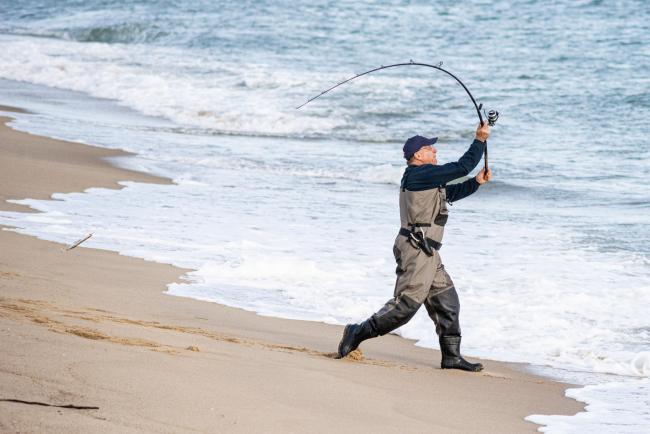



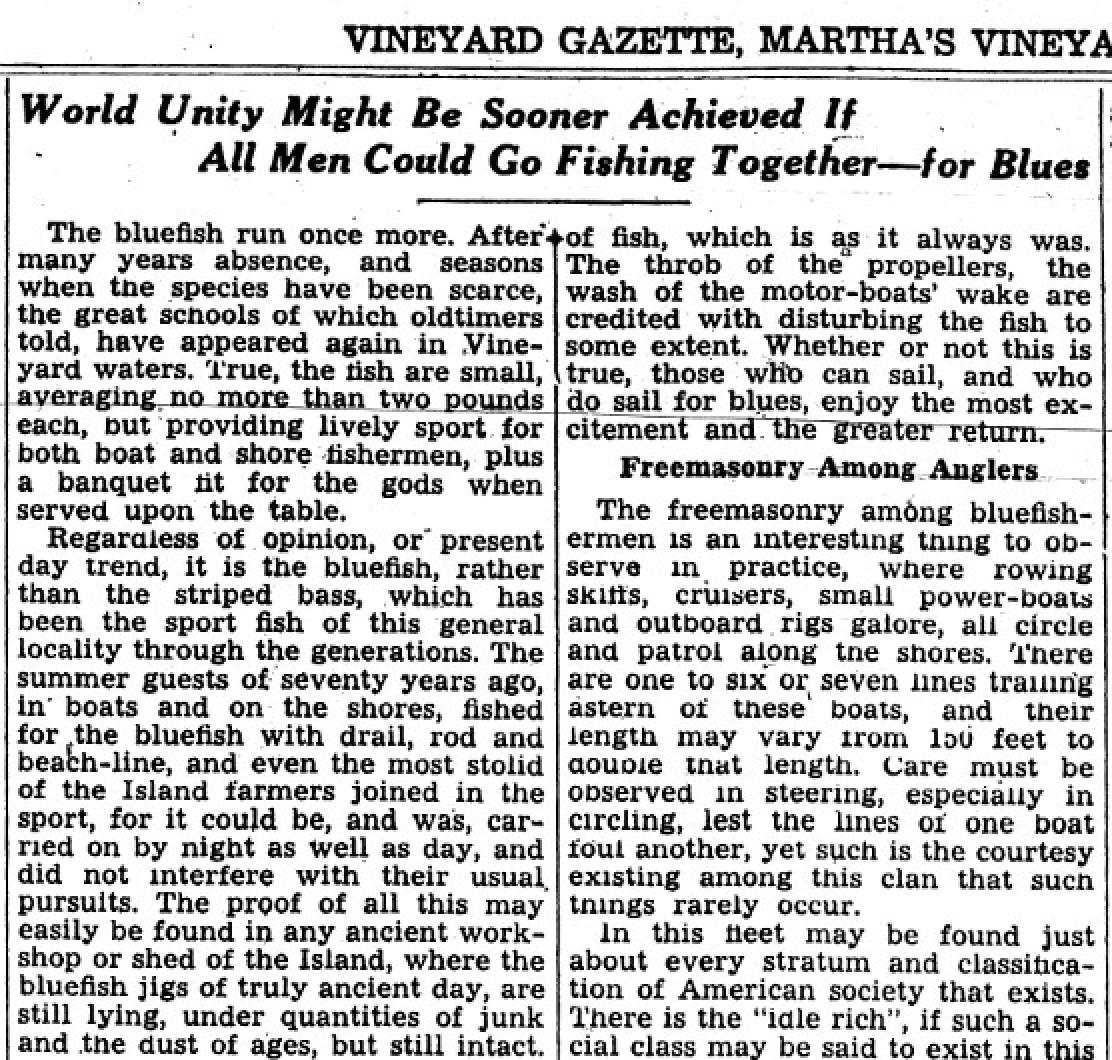
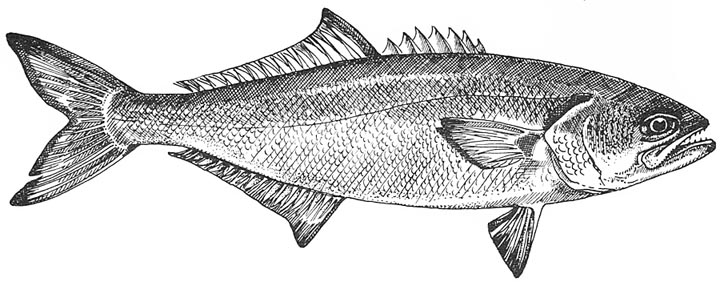
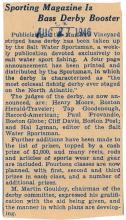
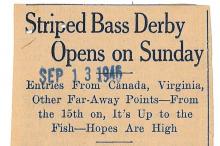
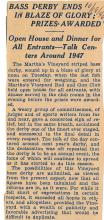
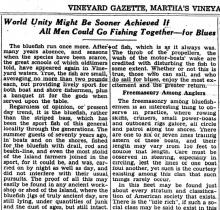
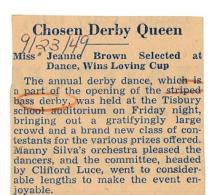
Comments